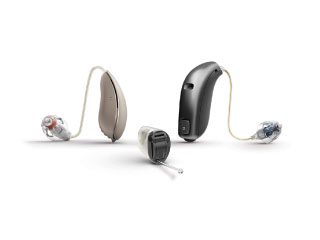Better Hearing Blog

All About the Attitude
While some people work to conceal their hearing instruments from public view, many of those wearing behind-the-ear Bluetooth headsets often prefer to show off their devices; yet, these devices are more alike than they are different. Each is a high-tech, hands-free device that is designed to be worn around, behind, or in the ear, and both can work with a telephone. If anything, the hearing instrument is the more sophisticated of the two because it can be programmed for various listening environments, cancel out background noise, manage feedback, reduce impulse noise, and separate sound signals into discrete frequencies. Considering all this, you’d think that hearing-instrument users would be proud to display their high-tech devices. It’s all about attitude.
Is vanity affecting your hearing? You are not alone. Millions of people mistakenly let vanity needlessly interfere with their decision to wear a hearing instrument. Come visit BETTER HEARING CENTER and discover how today’s hearing instruments are virtually disappearing. See the tiny, barely noticeable hearing instruments that are now available, and have a painless hearing test to determine the state of your hearing. As New Hampshire’s premier hearing care provider, we are the only hearing center that has served the Concord, New Hampshire, area for more than 55 years.
P.S. In the not-too-distant future, when consumers show a preference for digital watches paired
with wireless earphones instead of clunky cell phones, the question will be: Why aren’t you
wearing a hearing instrument?

Not Just Mailing It In
If you’ve ever thought about purchasing a hearing instrument through the mail or online, consider this: Today’s selection procedures utilize computers, which factor in hearing test results, loud sound tolerance, and multiple listening environments. The computer then indicates which models and settings would be most appropriate, after which the hearing instrument specialist fine-tunes adjustments based on the wearer’s personal preferences. The appropriateness of the fitting may be verified by the wearer listening to, and repeating, words presented in quiet or background noise. Then, a microphone placed in the ear canal may be used to measure the sound produced by the hearing instrument in the ear. All this requires a personal touch that cannot be duplicated by a one-size-fits-all device.
Once you have made the significant investment in better hearing, it’s important that your hearing instrument is operating at maximum performance and that you are comfortable wearing it. That’s hardly something you’ll find via the internet or mail order, and that’s why BETTER HEARING CENTER has made the commitment to provide you with personal attention from a clinical audiologist and other highly trained, skilled professionals, as well as carefully chosen, custom-fitted quality products. Start the process to better hearing—have your hearing tested soon at New Hampshire’s premier hearing care provider.
P.S. Dealing with an Audiologist in person effectively addresses any concerns that may arise during the all-important follow-up period after the initial fitting.

The Ultimate Benefit of Hearing Better
For people over age 70 who have “clinically meaningful hearing loss,” proper fitting with a hearing instrument can not only improve their ability to hear the television and radio, but it can also significantly improve their social interaction with family and friends, thereby helping them avert depression and withdrawal that may otherwise accompany old age. In addition, hearing loss can place older individuals at such a disadvantage when it comes to hearing doctors’ instructions that it can put their lives at risk. According to a 2015 study, people age 70 and older with moderate-to-severe hearing loss had a 54% higher risk of mortality. Even mild hearing loss was associated with a 21% increased risk of dying from all causes.
Proper hearing promotes better communication. When an uncorrected hearing impairment causes the loss of special and important moments in your life, it’s time to rediscover the benefits of healthy hearing and learn about the marvelous wonders now available in hearing instruments. Come see us at BETTER HEARING CENTER and discover how today’s hearing instruments are virtually disappearing from sight. We offer a complete range of hearing healthcare services at New Hampshire’s premier hearing care provider.
P.S. Similar to high blood pressure being regarded as an important contributing factor to a number of serious health conditions, hearing loss is increasingly being recognized as an important health and longevity factor.

A Heart-Healthy Diet Helps Hearing
In recent years, health professionals have advocated that we do all we can to eat foods that promote the health of the cardiovascular system. Now, it seems we all have even more reason to embrace heart-healthy diets. According to a recent analysis of 81,000 women in the Nurses’ Health Study II, those whose eating habits most closely resembled a Mediterranean-style diet or the anti-hypertension DASH diet were nearly one-third (30 percent) less likely to develop moderate or severe hearing loss over a 22-year period than women with the least adherence to the elements of these diets. It is thought that heart-healthy diets protect against hearing loss by reducing the oxidative damage caused by free radicals and lowering nerve inflammation.
In addition to a dietary approach, two important steps you can take to help protect your hearing are wearing ear protection in loud, noisy environments and having your hearing checked regularly to stay on top of possible hearing loss. Hearing tests are easy, comprehensive, painless ways of evaluating this precious sense. If you’ve never had a hearing test, or if it’s been awhile since your last one, take the time today to call us at BETTER HEARING CENTER. If wearing a hearing aid is indicated, we can show you a variety of instruments and determine which is best for you. We are New Hampshire’s premier hearing care provider.
P.S. Previous research has linked overall healthy diets to a reduced risk of hearing loss.

Warding off Dementia
Surveys indicate that seniors are more afraid of developing dementia, which includes Alzheimer’s disease, than they are fearful of getting cancer, heart disease, or a stroke. This fear of dementia is predicated on worries about losing independence and becoming a burden on loved ones. While there is currently no cure for dementia, experts recommend certain lifestyle changes that minimize seniors’ risk of developing the condition. These changes include lowering blood pressure to normal levels, giving up smoking, losing excess weight, remaining socially engaged, and treating diabetes. In addition, hearing loss has recently been discovered to be a risk factor for dementia. Treating hearing loss with a hearing instrument helps reduce feelings of depression and social isolation, which promote dementia.
If you have a hearing impairment, you are missing more than just the understanding of words. Hearing keeps you in touch with the world, lets you respond to sound, and reassures you of changing surroundings. After the age of 50, a regular hearing test should be considered as important as a yearly physical checkup. BETTER HEARING CENTER offers comprehensive hearing services by a certified clinical audiologist including evaluations, custom fittings, a full range of hearing instruments, accessories, follow-up support, and repairs. We are New Hampshire’s premier hearing care provider.
P.S. While it is not known if treating hearing loss can prevent memory loss, it is worth getting your hearing checked.

Selecting the Most Suitable Instrument
When it comes to the selection of a hearing instrument, it is generally true that bigger is more powerful. While individuals with mild-to-moderate hearing loss will most likely find that in-the-canal instruments can adequately meet their needs, those with moderate-to-severe hearing loss are usually best served by larger, behind-the-ear instruments with greater power and capabilities. However, larger does not necessarily mean more intrusive. Unlike traditional behind-the-ear instruments, an “open fit” instrument is also worn behind the ear, but is smaller. Instead of housing the microphone, digital processor, battery, and speaker in one unit, open fit instruments use a thin tube to connect a tiny speaker to a smaller behind-the-ear housing. This design is less visible and affords greater comfort.
P.S. Because open fit hearing instruments do not require an ear mold, they provide a more natural hearing experience.
